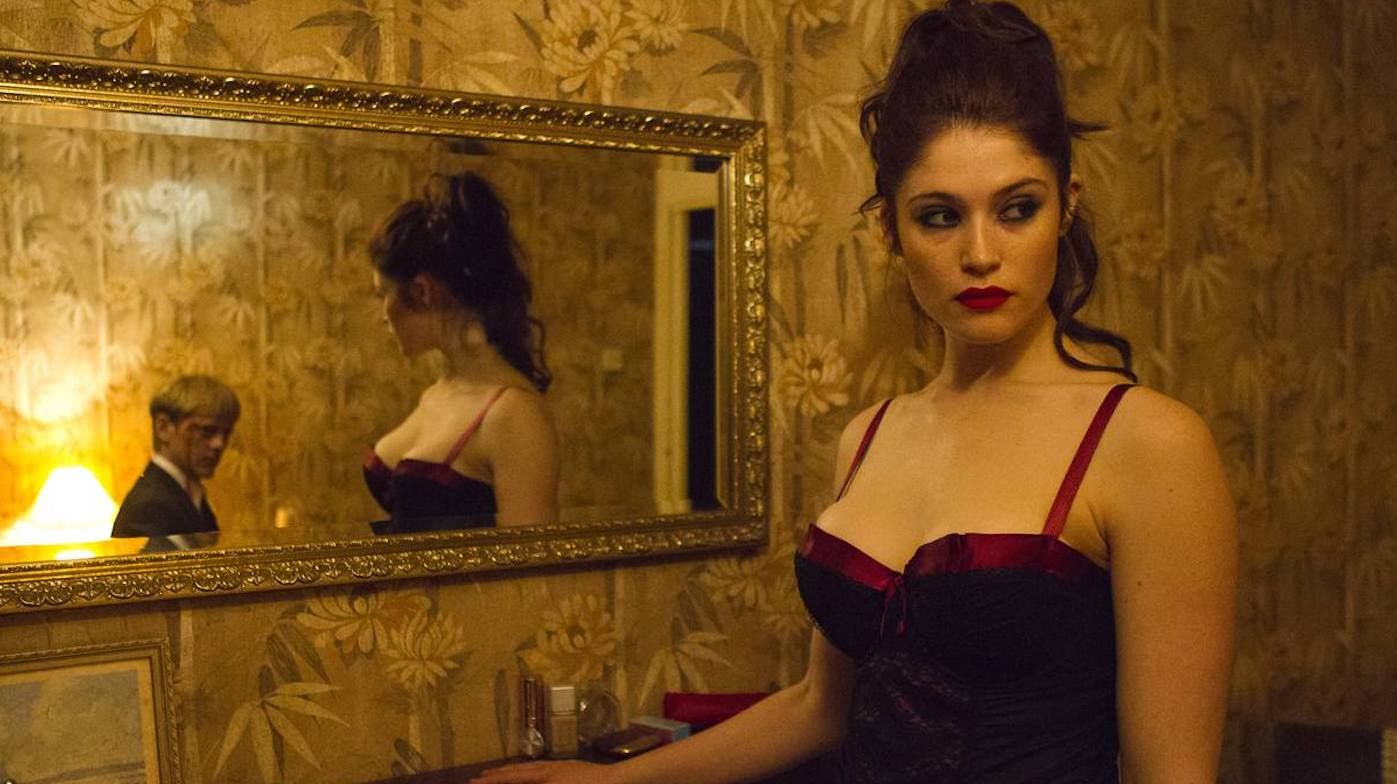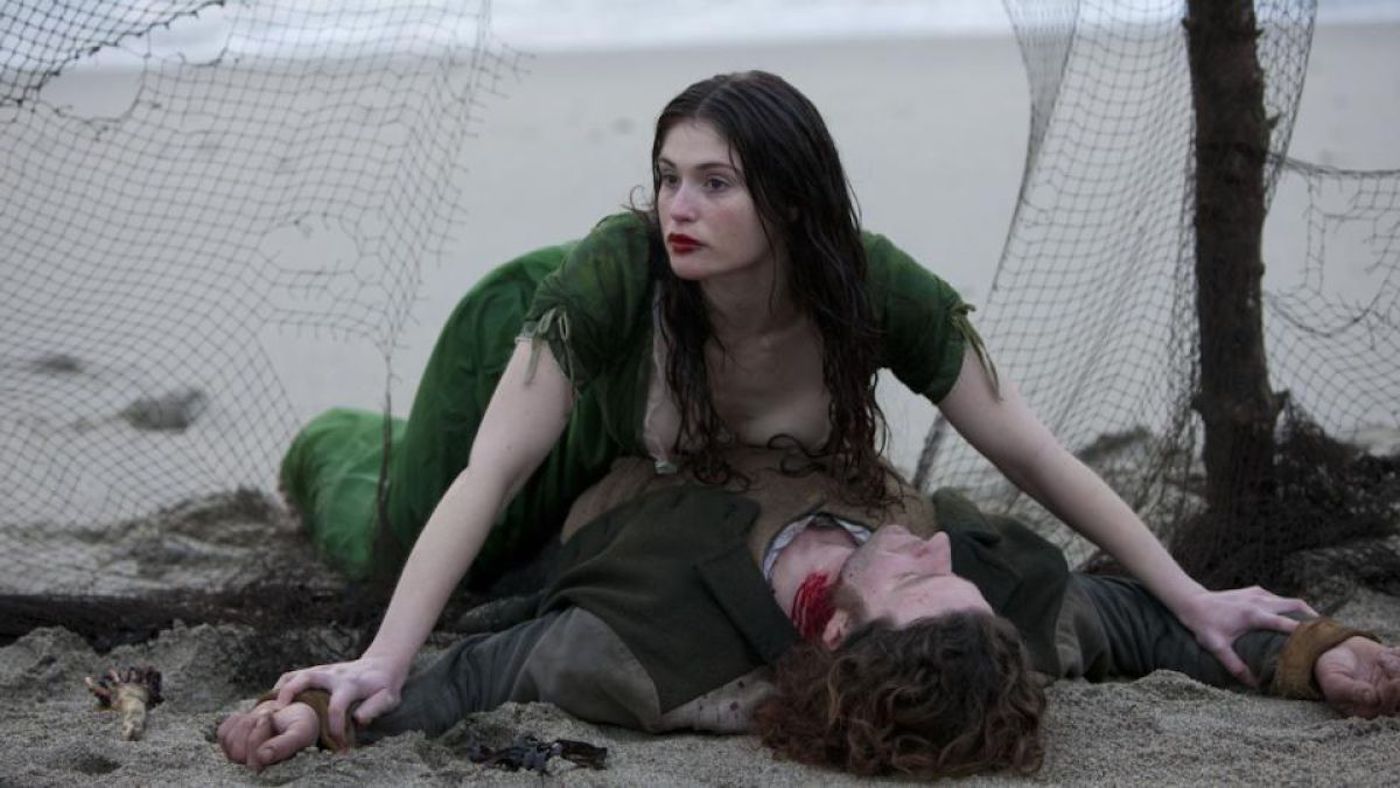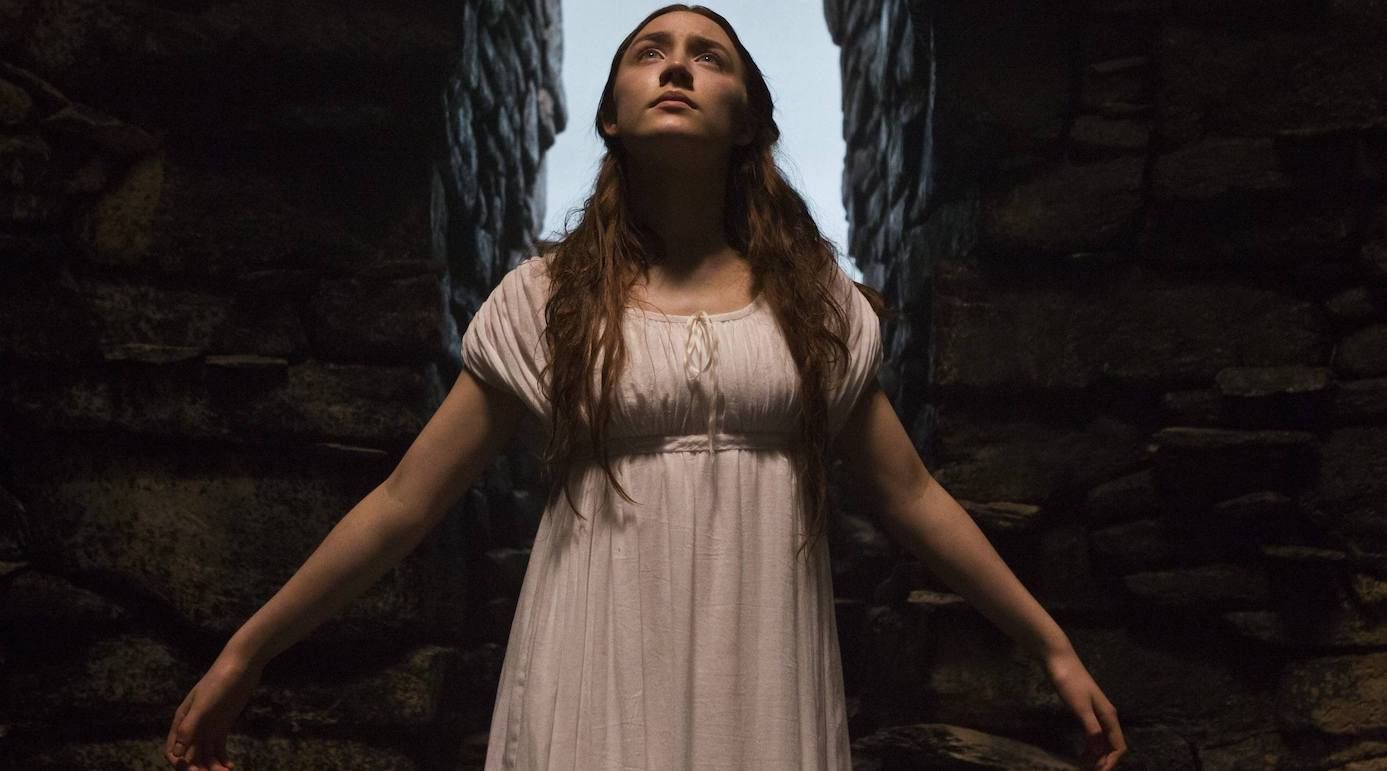[TW: This article discusses the general topic of sexual assault and how it is portrayed in Byzantium.]
The 2010s gave us many sacred pop culture moments and movements; most notably a worldwide frenzy for vampires and ghoulish night creatures like that of the iconic Twilight series. And during this decade of wild music, hilarious celebrity moments, and the rise of subculture fandoms for what felt like every kind of content, playwright and author, Moria Buffini, managed to craft a masterpiece with the 2012 film, Byzantium. Based on her 2008 play, A Vampire Story, Byzantium is chronicled by Eleanor Webb (Saoirse Ronan) as she writes and constantly revisits her 18th-century world while living in the present.
Eleanor recounts her young mother, Clara Webb's (Gemma Arterton), harrowing tale of enslavement and prostitution at the hands of a Royal Navy officer, Captain Ruthven (Jonny Lee Miller), accompanied by his naval friend, Captain Darvell (Sam Riley), who disapproves of his "friend's" immoral and detestable behavior. Ultimately, raped and forced into sex work at a young age, Clara endured a damaging lifetime of heinous abuse, with Eleanor as a result of an assault. In her anguish, she gave her daughter away to an orphanage. Through the years she painfully withered away due to tuberculosis and a risky life as a sex worker, Clara was finally offered a gift of sorts, one of rebirth.
Following an unexpected visit from a presumed dead Darvell who seeks out Ruthven to reclaim the possessions stolen from him, Clara follows his obscured lead as he explains his remarkable retained youth after so many years. A map that leads to an island of stone where one must make a sacrifice and be fearless catches Clara’s ears and as Darvell leaves, Clara shoots Ruthven, stealing his ‘gift’, and escapes to the island. Here she dies and awakens as a vampire, healthy, and with new eyes for the world. Unbeknownst to her, the gift she took was intended for only men, which Darvell explains as he’s a part of an ancient scholarly fraternity, The Pointed Nails of Justice.
All the while, a vengeful Captain Ruthven seeks out a now teenage Eleanor as a way to get back at Clara. He rapes his own daughter, leaving her barely alive. Clara arrives at the scene too late, murdering her long-time oppressor. Desperate, codes of the brotherhood be damned, Clara takes Eleanor to the island and has her daughter transform into a vampire in order to save her. The women retreated into the lifestyle of wayfaring strangers, wandering the nights, running from the brotherhood for over two centuries. And it’s here where Eleanor's story truly begins.
Juxtaposed to the stereotypical depictions of classical and contemporary vampires, Clara and Eleanor as a clashing mother-daughter duo illustrate the potential for women to be dynamic characters, outside of love and relationships. Most vampire tales center around a male vampire sending his female lover into damnation alongside him. Oftentimes these archetypes highlight women through a misogynistic gaze, as objects used for male pleasure, or as obedient servants to their new dark lord. What Moria Buffini does, is take the poeticism of Gothic era vampire lore and places women struggling with trauma and striving for freedom as opposed to ordinary love.
Buffini and director, Neil Jordan, then implicate lesser-known versions of the classic tale of Dracula with references to historical figures such as the 15th century Count Vlad "The Impaler", a notorious Turkish usurper who vigorously claimed regions throughout Wallachia and punished his enemies or violators of his strengthening government rule. Hence, his reputation of impaling victims earned him his name. Another notable historical figure with clear similarities to Clara draws from the equally chilling Elizabeth Bathory of the late 1500s, early 1600s. Known today as one of the most prolific female serial killers in history with upwards of 600 victims, Bathory was a noblewoman known for her obsession with blood, heinously murdering young servant women for their blood which she believed aided in keeping a youthful glow, tight skin, and ultimate beauty. Clara internalizes an obsession with control and power, with these as her sole motivations for stealing Captain Ruthven's shot at eternal life.
Bathory's story takes place in her Hungarian castle of Csejte while Vlad's tale is set in the Eastern European Carpathian mountain region. In Byzantium, a similar fictionalized depiction of the vampire birthing place is shown as The Healing Shrine, a massive black rock island with little life and agriculture. It is here that one must make the utmost sacrifice: facing a grisly death in order to be reborn with the gifts of the occult. Clara and Eleanor both claim freedom and physical healing from the Shrine, however, the burden of immortality becomes apparent as Eleanor recites her misery and her mother's trauma history. She vents in her writing and by telling her victims before killing them.
Buffini and Jordan craft an unorthodox vampire story that elaborates on the notion of powerful choices. Clara makes sacrifices for her daughter, and although an imperfect mother, she still holds Eleanor's safety from the fraternity above all else. As the pair resides in a sleepy seaside town of a former coastal resort and jointly the home to Eleanor's orphanage and sexual trauma, they are stalked by two members of the brotherhood. Darvell, and Savella (Uri Gavriel) who have searched for them relentlessly during the past two centuries. On a night of hustling, Clara meets a broken man, Noel, who offers up his home, a dilapidated hotel called Byzantium.
Amidst connecting that her new home is the site of misery and anguish, Eleanor increases her kill count, utilizing the elderly population while Clara restarts a prostitution business at the hotel. Eleanor walks down the path of memory, traumatic flashbacks, and isolates her emotions even more so when she meets her suitor, Frank (Caleb Landry Jones), a teenager dying of leukemia. Clara, jealous, and hardened by her past, threatens Eleanor's small slice of happiness. It is this attitude that defines their tattered relationship.
In poetic fashion and similar moxie to writers like Edgar Allen Poe or Mary Wollstonecraft, Eleanor craves to expose her centuries heavy burden; a weight that was never hers to carry. Clara passed on a cycle of distraught and abuse the moment she revealed her life and circumstances to her child. Even as she saves her daughter's life, she gives her an impossible choice: face a slow and painful death with the trauma of her sexual assault and the psychological strain of realizing it was done at the hand of her own father or find privilege and liberty in immortality, becoming a child of the night.
By the end of the film, it becomes clear that Clara has realized how her life and story have held both her and her child hostage to an unforgettable story. The moment Clara decided to become a vampire, brace death, and restore power to the hands of the weak, she stepped into her sexual prowess, defied gender norms of her Gothic society, and began redefining her life, although molded by the fear of the brotherhood finding her and Eleanor. While Eleanor was never truly given the chance to step into her power, she grips her opportunity when she falls for Frank. A piece of Clara lives on within Eleanor, as she desires to cure her new lover and ultimately decides to spend a lifetime with him.
Byzantium presents a striking account of injury and suffering unlike any other, but it strikes as the ultimate different kind of vampire film that really grinds down the lore into an ethereal masterpiece that showcases Buffini's vivid eye for genuine storytelling. Female vampires can be more than just henchwomen or slaves to a dark lord. They can be emotional, cunning, kind, resourceful, and complex all at once. They can be just as deranged and terrifying as their ghoulish male counterparts. And Buffini and Jordan's brilliant approach to the iconic Dracula is a refreshing homage.




